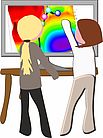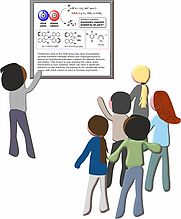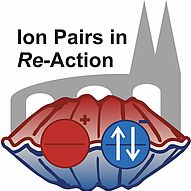
Profile/Research

General Descripton according to DFG
Research Training Groups (RTG) are established by universities to promote early career researchers. The german expression is 'Graduiertenkolleg' (GRK).
Research Training Groups combine innovative top-level research and the structured promotion of excellent early career researchers.
Research programme - high scientific quality and originality (interdisciplinary approach desired) at an international level
Qualification programme - of direct relevance to the research programme, including innovative teaching and supervision elements, which should clearly extend beyond the courses (doctoral colloquia) usually offered in doctorate programmes
Visiting researcher programme - integrated into the qualification programme, adding internationalisation to the training provided





What to expect from this RTG
This RTG will give students the opportunity of a highly qualifying scientific education at an internationally competitive level in an excellent research environment. The programm is funded by the Deutsche Forschungsgemeinschaft (DFG), the German Research Foundation and set up for four and a half years. The research programme is defined around the topic Ion Pair Effects in Molecular Reactivity (scientific information see below) and will provide interdisciplinary cooperations, transfers of concepts and a broad and high impact in academia and industry. In addition, the topic Ion Pairs will allow to combine model systems, methods and perspectives from various chemical disciplines like organic, inorganic, physical and computational chemistry, in an unique and focussed way based on their common physical properties. Thus, this RTG provides an ideal basis for a broad and stimulating education programme including international speakers and research stays for PhD students.
Research Topic of the RTG 2620: Ion Pair Effects in Molecular Reactivity
Ion pairs are omnipresent in chemistry, since each heterolytic reaction or one electron transfer reaction generates an ion pair. In addition, the electrostatic attraction between counterions provides the strongest interaction energies of all intermolecular forces, which is successfully exploited throughout the chemical disciplines. Thus, many famous organometallic reagents and whole classes of inorganic clusters are ion pairs. Futhermore, iminium and ion pair catalysis emerged as hot topics. However, predicting ground state structures, intermediates and transition states of small ion pairs especially in solution remains a challenge. Ion pairs often form aggregates. The very low distance dependence of their strong interaction energy causes various structures similar in energy and pronounced conformational flexibilities. Furthermore, they are highly sensitive to solvent or substrate interactions. As a result, experimental access to ion pair structures in solution is missing or highly demanding and theoretical calculations often fail to predict these correctly.
One goal of this RTG is to elucidate the structures and reaction mechanisms of ion pairs. Mechanistic junctions on the transition state level will be addressed for parallel and multimodal reaction pathways based on experiments and supported by calculations. We transfer refined ion pair concepts to different chemical disciplines, aiming at the development of new and improved reactions, especially in catalysis.
The chemical disciplines represented in this RTG provide complementary perspectives, methods and concepts to investigate ion pairs. However, the fundamental physical interactions involving Coulomb forces, dipole moments, or polarization are principally the same. Therefore, in this RTG closed and organic open-shell ion pairs from various chemical fields will be investigated by an interdisciplinary team of spectroscopists, theoreticians and synthetic chemists from organic, inorganic, theoretical, and physical chemistry to achieve a maximum transfer of concepts. Qualification activities on the individual student level, project team level and RTG level ensure highly demanding scientific projects, a broad and interdisciplinary training of PhD students and short PhD qualification times.
Overall, the vision of this RTG is to provide transferable concepts of ion pairs for the prediction and control of structures, reactivities and enantioselectivities and an excellent interdisciplinary graduate student education.





